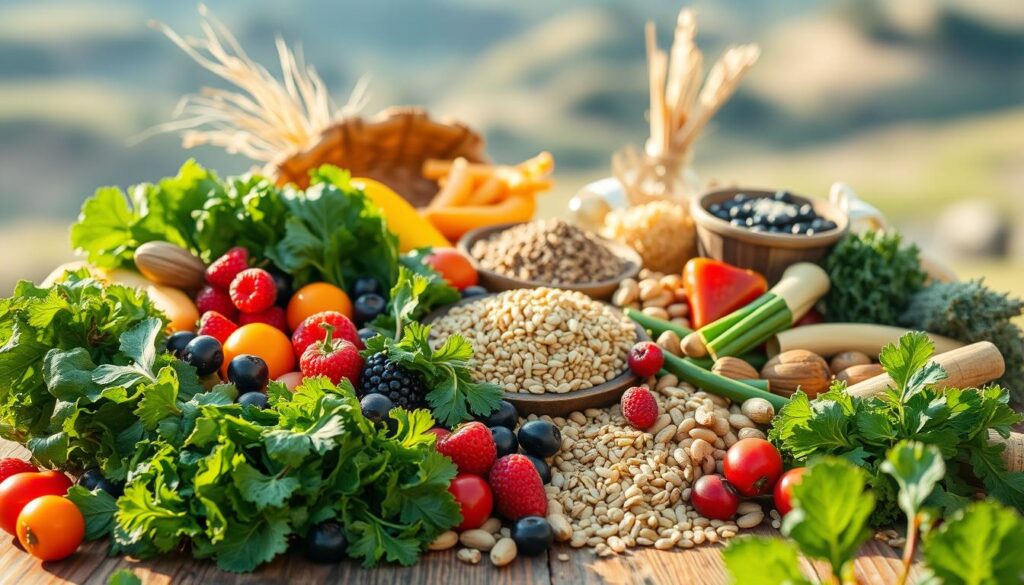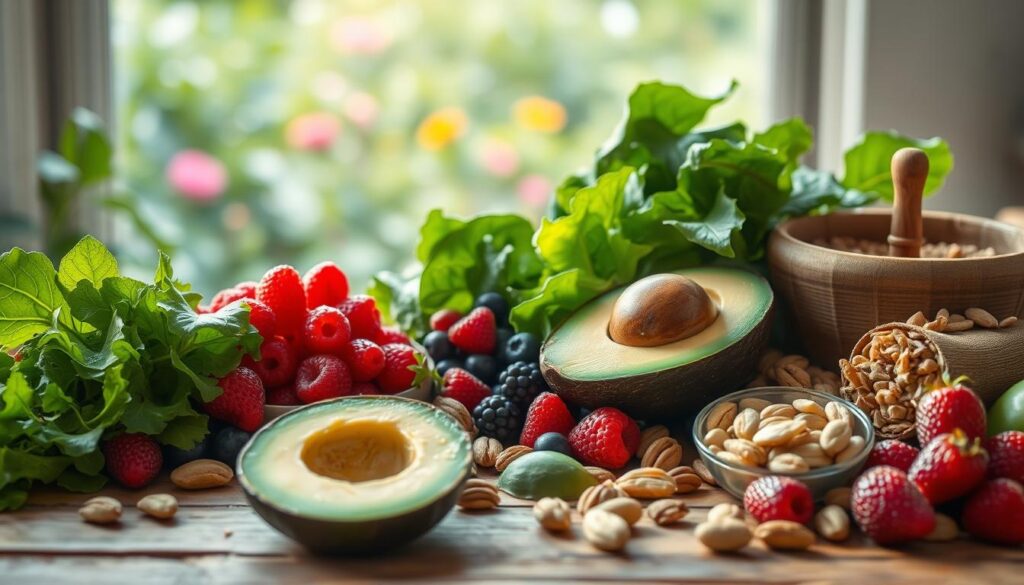Ever wondered why some foods make you feel great, while others make you tired? It’s because of nutrient-dense foods. They’re full of vitamins, minerals, and other good stuff, even though they have fewer calories.
In a world full of diet trends, choosing nutrient-rich foods is key to feeling better. This guide will show you why these superfoods are important for your health. You’ll also learn how to add them to your daily meals.
By eating nutrient-dense foods, you can boost your energy, help your organs work better, and stay healthy longer.
Key Takeaways
- Nutrient-dense foods provide maximum nutrition with fewer calories.
- Incorporating superfoods can enhance overall wellness.
- These foods support energy levels and organ function.
- Choosing nutrient-rich options can lower the risk of chronic diseases.
- Healthy eating should include a variety of nutrient-dense foods.
What Are Nutrient-Dense Foods?
Nutrient-dense foods are key in nutrition. They give you important vitamins and minerals without too many calories. These foods are the base of a healthy diet because they pack a lot of nutrients into a small amount of calories.
Defining Nutrient Density
Nutrient density is about how much good stuff a food has compared to its calories. Foods high in nutrient density are super good for you. They have lots of vitamins, minerals, and other nutrients that help keep you healthy.
Importance of Nutrient-Dense Foods
In today’s world, nutrient-dense foods are more important than ever. We’re surrounded by processed foods that are full of calories but not much good. Eating nutrient-dense foods helps fight obesity and makes sure you get all the nutrients you need. Adding these foods to your meals boosts your health and well-being. For more on why they’re so good, check out this resource.
Health Benefits of Nutrient-Dense Foods
Nutrient-dense foods are packed with health benefits. They can boost your energy, lower disease risk, and strengthen your immune system. Knowing how they work can help you choose better foods.
Improved Energy Levels
Eating nutrient-dense foods boosts your energy. They give your body the vitamins, minerals, and nutrients it needs. This helps you stay energized all day, avoiding fatigue and improving your daily activities.
Lower Risk of Chronic Diseases
A diet full of nutrient-dense foods can protect you from chronic diseases. These foods support your body’s functions, fight inflammation, and help manage diseases like heart disease and diabetes. Making smart food choices can lead to long-term health.
Enhanced Immune Function
Your immune system fights off infections and diseases. Nutrient-dense foods give your body the vitamins and minerals it needs to stay strong. Eating foods like fruits, vegetables, and whole grains can boost your immune system and improve your health.
Examples of Nutrient-Dense Foods
Nutrient-dense foods are super healthy because they have lots of nutrients but not too many calories. Knowing which foods fall into this category can help you eat better. Here are some top picks for nutrient-dense foods.
Fatty Fish: Salmon and Sardines
Fatty fish like salmon and sardines are full of omega-3 fatty acids. These fats are good for your heart, reduce swelling, and help your brain work better. Adding fatty fish to your meals can greatly improve your health and taste.
Leafy Greens: Kale and Spinach
Leafy greens, like kale and spinach, are loaded with vitamins and minerals. They have almost no calories and help with digestion and weight control. Their high nutrient content makes them key to a healthy diet, boosting your overall health.
Whole Grains: Quinoa and Brown Rice
Whole grains, including quinoa and brown rice, give you lasting energy and important nutrients like fiber and B-vitamins. Eating these grains helps you feel full and gives you energy. They’re essential for a balanced diet.
Nutrient-Dense Foods for Health
Eating a variety of foods is key to staying healthy. By eating different foods, you get more nutrients. This helps prevent nutrient deficiencies and keeps your body working well.
Importance of Variety in Diet
Eating a balanced diet is good for your health. Foods like fruits, vegetables, whole grains, and lean proteins are essential. They give you the nutrients your body needs and help you absorb them better.
Balancing Macronutrients
It’s important to eat the right mix of nutrients. Make sure your meals have proteins, healthy fats, and complex carbs. This balance helps with weight control and energy, making it easier to stay healthy.
| Macronutrient | Recommended Daily Percentage | Food Sources |
|---|---|---|
| Carbohydrates | 45-65% | Whole grains, fruits, vegetables |
| Proteins | 10-35% | Lean meats, fish, legumes, nuts |
| Fats | 20-35% | Avocados, olive oil, seeds, fatty fish |
How to Incorporate Nutrient-Dense Foods into Your Diet
Adding nutrient-dense foods to your diet can boost your nutrition. Simple changes can greatly improve your health and wellness. By swapping less healthy foods for better ones, you can make a big impact.
Planning meals with nutrient-rich ingredients makes healthy eating easier. It turns it into a lasting part of your lifestyle.
Making Smart Food Swaps
Smart food swaps help you eat better without losing flavor. Here are some tips to enhance your meals:
- Replace white bread with whole-grain options to increase fiber.
- Swap regular pasta for whole-grain or legume-based pasta.
- Choose Greek yogurt instead of sour cream for added protein.
- Use avocado instead of mayo on sandwiches for healthy fats.
- Incorporate fresh vegetables as pizza toppings instead of processed meats.
Meal Prep Ideas for Nutrient Density
Meal prep helps you stick to eating nutrient-dense foods. Here are some ideas to start:
- Prepare a batch of quinoa or brown rice to serve as a base for various meals.
- Chop a variety of colorful vegetables and store them for quick salads.
- Make smoothie packs with leafy greens, fruits, and seeds for easy breakfast options.
- Cook large portions of lean protein, such as chicken or fish, to add to salads and wraps.
- Portion out healthy snacks like nuts and fruits for on-the-go nutrition.
Understanding Vitamins and Minerals in Foods
Exploring the key vitamins and minerals in foods helps you build a diet rich in nutrients. Vitamins A, C, D, and B12 are vital for our bodies. Minerals like calcium and potassium are also key for our health. Knowing about these nutrients helps you make better food choices for your health.
Key Vitamins to Look For
When planning your diet, focus on these vitamins:
- Vitamin A: It’s good for your eyes and immune system. Find it in carrots and sweet potatoes.
- Vitamin C: It helps with collagen and protects against damage. Citrus fruits and strawberries are great sources.
- Vitamin D: It helps your body absorb calcium. You can find it in fatty fish and fortified dairy.
- Vitamin B12: It’s important for your nerves and making red blood cells. Animal products like meat and dairy are good sources.
Essential Minerals for Health
Minerals are also key for good health. Make sure to include these minerals in your diet:
- Calcium: It’s vital for strong bones. You can get it from dairy, leafy greens, and fortified plant-based foods.
- Potassium: It helps control blood pressure and fluid balance. Bananas, potatoes, and tomatoes are good sources.
- Magnesium: It supports muscles and nerves. Nuts, seeds, and whole grains are good sources.
- Iron: It’s needed for carrying oxygen in the blood. Red meat and legumes are rich in iron.
The Role of Whole Foods in Nutrient Density
Whole foods are key to a nutrient-dense diet. They include fruits, vegetables, whole grains, nuts, and seeds. These foods are packed with vitamins, minerals, and fiber. Unlike processed foods, whole foods give the body what it needs to stay healthy.
Benefits of Whole Foods vs. Processed Foods
Choosing whole foods over processed ones has clear benefits. Whole foods have a higher nutrient content, leading to better health. Here’s a comparison:
| Aspect | Whole Foods | Processed Foods |
|---|---|---|
| Nutritional Content | High in vitamins, minerals, and fiber | Often low in nutrients, high in calories |
| Presence of Additives | Minimal or no additives | Contains preservatives, artificial flavors, and colors |
| Health Benefits | Supports overall health and aids digestion | May contribute to weight gain and health issues |
| Satiety | Promotes feeling full and satisfied | Can lead to overeating due to lack of fiber |
Eating more whole foods can boost your digestion and energy. Choosing whole foods over processed ones can greatly improve your health and energy levels.
Healthy Eating Patterns for Optimal Nutrition
It’s important to have good eating habits for the best nutrition. Eating a variety of foods is key. Plant-based foods are great for a healthy diet.
Guidelines for Balanced Nutrition
To eat well, follow these tips:
- Eat at least 5 fruits and veggies every day.
- Add lean proteins like chicken or beans in the right amounts.
- Enjoy healthy fats from avocados and nuts.
- Take your time eating, so you know when you’re full.
Focusing on Plant-Based Foods
Adding more plant-based foods to your diet is good for you. They’re full of nutrients and low in bad fats. Here’s how to add them:
- Switch to whole grains like quinoa or brown rice instead of refined ones.
- Use beans and lentils as protein in your meals.
- Try different fruits and veggies to make your meals colorful and nutritious.
For more tips on better eating, check out balanced nutrition and healthier choices.
Snacking on Nutrient-Dense Foods
Adding healthy snacks to your day can really help your nutrition. Choosing foods rich in nutrients gives your body what it needs. It also keeps you away from empty calories that don’t offer much benefit. Trying different healthy snacks can make eating better a fun part of your day.
Healthy Snack Options to Try
- Nuts: Almonds, walnuts, and cashews are full of good fats.
- Greek Yogurt: It’s a great source of protein and goes well with fruits or granola.
- Fresh Fruits: Apples, bananas, and berries are hydrating and full of nutrients.
- Vegetable Sticks: Carrots and celery with hummus are crunchy and filling.
Avoiding Empty Calories
It’s important to avoid foods with too much sugar and unhealthy fats. Things like candy, chips, and sugary drinks might taste good but don’t really feed your body. Making smart choices about what you snack on can greatly improve your health and energy.
Cooking Tips to Preserve Nutrients
Good food preparation is key to keeping nutrients in your meals. Knowing the best cooking methods helps a lot. These tips will help you cook veggies well and keep your food nutritious.
Best Cooking Methods for Vegetables
Some cooking ways are better than others for veggies:
- Steaming: It keeps more nutrients than boiling because veggies cook in their own moisture.
- Sautéing: A bit of healthy oil, like olive oil, adds flavor and keeps nutrients while adding good fats.
- Roasting: It makes flavors stronger and keeps some nutrients, using little oil and seasoning.
Maintaining Nutritional Value in Food Preparation
There are more ways to keep nutrients in your food:
- Use minimal water: Boiling or blanching veggies? Use as little water as you can to save nutrients.
- Avoid overcooking: Cook veggies just until they’re tender. This keeps them colorful and full of nutrients.
- Keep skins on: Many fruits and veggies have nutrients in their skins. Washing them well and leaving the skin on boosts their health benefits.
Why You Should Limit Processed Foods
In today’s fast world, processed foods seem convenient but harm our health. They often have lots of sugar, unhealthy fats, and salt. But they don’t give us much good stuff. It’s key to cut down on these foods to stay healthy.
Understanding Empty Calories
Processed foods are full of empty calories. These calories don’t give your body any good stuff. You might feel full for a bit, but then you’ll get hungry again. Eating foods that are full of nutrients is better for you.
Nutritional Consequences of a Processed Diet
Eating too much processed food can hurt you. It can make you gain weight and increase your risk of serious diseases. It can also mess with your mood. Eating healthy, like using whole foods, is better for you. Look into healthy recipes to make better choices.
Conclusion
Adopting a nutrient-dense diet is key for better health and wellness. Foods high in vitamins, minerals, and antioxidants help manage weight, boost energy, and lower disease risk. This guide has shown the health perks of these foods, helping you make smart food choices.
Adding these foods to your daily routine is easy. Start by mixing whole foods into your meals and snacks. As you try new things, you’ll nourish your body and live a healthier life. Your journey to wellness starts with eating mindfully.
By focusing on nutrient-rich foods, you can change how you view nutrition. Start adding nutrient-dense foods to your meals. You’ll find a path to better health, energy, and well-being.






